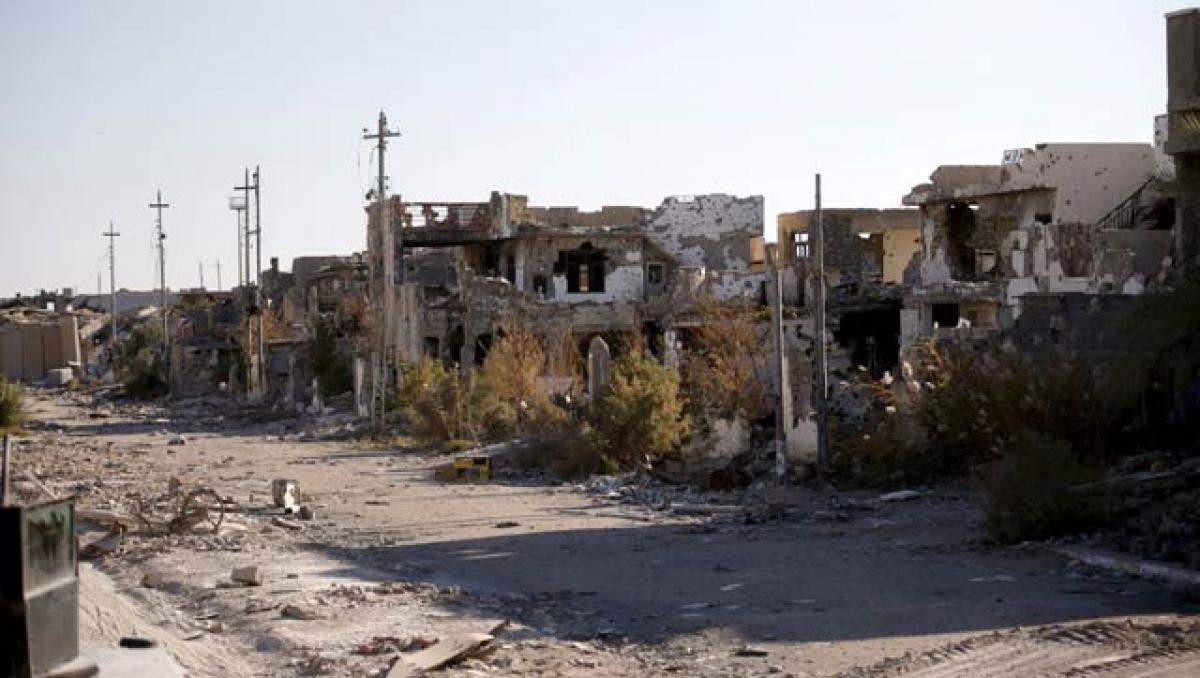Live
- DEO suspends teacher accused of sexual assault
- PM ‘cursing’ Congress out of despair: Maharashtra Cong Chief
- Applications are invited for Junior Colleges Scheme District Scheduled Castes Development Officer Ramlal
- A nomination was filed on the second day for the Nagar Kurnool parliamentary seat
- SP Gaikwad inspected the Telangana Amarnath Saleswaram Jatara yatra arrangements
- Rahul Gandhi's decision to contest from Wayanad shows 'lack of confidence': BJP President Nadda
- IPL 2024: Delhi bowlers will go after all of SRH’s top-order batters, says head coach Ricky Ponting
- At Amroha rally, PM Modi sends out ‘meaningful’ message for Muslims and Hindus
- Tripura records highest 79.83 pc voter turnout in Northeast
- The government has to clear the confusion
Just In

As US-led offensives drive back Islamic State in Iraq, concern is growing among US and UN officials that efforts to stabilise liberated areas are lagging, creating conditions that could help the militants endure as an underground network.
Washington: As US-led offensives drive back Islamic State in Iraq, concern is growing among US and UN officials that efforts to stabilise liberated
areas are lagging, creating conditions that could help the militants endure as an underground network. One major worry: not enough money is being committed to rebuild the devastated provincial capital of Ramadi and other towns, let alone Islamic State-held Mosul, the ultimate target in Iraq of the US-led campaign.
Lise Grande, the No 2 UN official in Iraq, told Reuters that the United Nations is urgently seeking $400 million from Washington and its allies for a new fund to bolster reconstruction in cities like Ramadi, which suffered vast damage when US-backed Iraqi forces recaptured it in December. "We worry that if we don't move in this direction, and move quickly, the progress being made against ISIL may be undermined or lost," Grande said, using an acronym for Islamic State.
Adding to the difficulty of stabilising freed areas are Iraq's unrelenting political infighting, corruption, a growing fiscal crisis and the Shiite Muslim-led government's fitful efforts to reconcile with aggrieved minority Sunnis, the bedrock of Islamic State support. Some senior US military officers share the concern that post-conflict reconstruction plans are lagging behind their battlefield efforts, officials said. "We're not going to bomb our way out of this problem," one US official said, speaking on condition of anonymity.
Islamic State is far from defeated. The group still controls much of its border-spanning "caliphate," inspires eight global affiliates and is able to orchestrate deadly external attacks like those that killed 32 people in Brussels on March 22. But at its core in Iraq and Syria, Islamic State appears to be in slow retreat. Defense analysis firm IHS Janes estimates the group lost 22 percent of its territory over the last 15 months.
Washington has spent vastly more on the war than on reconstruction. The military campaign cost $6.5 billion from 2014 through Feb. 29, according to the Pentagon. The United States has contributed $15 million to stabilization efforts, donated $5 million to help clear explosives in Ramadi and provided "substantial direct budget support" to Iraq's government, said Emily Horne, a National Security Council spokeswoman.
Secretary of State John Kerry acknowledged the need for more reconstruction aid while in Baghdad. Kerry, who announced $155 million in additional US aid for displaced Iraqis. Ramadi's main hospital, train station, nearly 2,000 homes, 64 bridges and much of the electricity grid were destroyed in fighting, a preliminary UN survey found last month. Thousands of other buildings were damaged.
Some 3,000 families recently returned to parts of the city cleared of mines, according to the governor, Hameed Dulaymi, but conditions are tough. Power comes from generators. Water is pumped from the Euphrates River. A few shops are open, but only for a couple of hours a day. "The success of the campaign against ISIL in Iraq does depend upon political and economic progress as well," Defense Secretary Ash Carter said.
"Economically it's important that the destruction that's occurred be repaired and we're looking to help the Iraqis with that." Asked about the upcoming $400 million UN request, Horne said the United States welcomed the new fund's establishment and "will continue to lead international efforts to fund stabilization operations." The United States hasn't yet announced what it will contribute.
Washington has helped train 15,000 Sunni fighters who are now part of the Iraqi government's security forces. But there has been little movement on political reforms to reconcile minority Sunnis, whose repression under former prime minister Nuri al-Maliki's Shiite-led government led thousands to join Islamic State.Unless that happens, and Sunnis see that Baghdad is trying to help them return home to rebuild, support for the militants will persist, experts said.

© 2024 Hyderabad Media House Limited/The Hans India. All rights reserved. Powered by hocalwire.com







